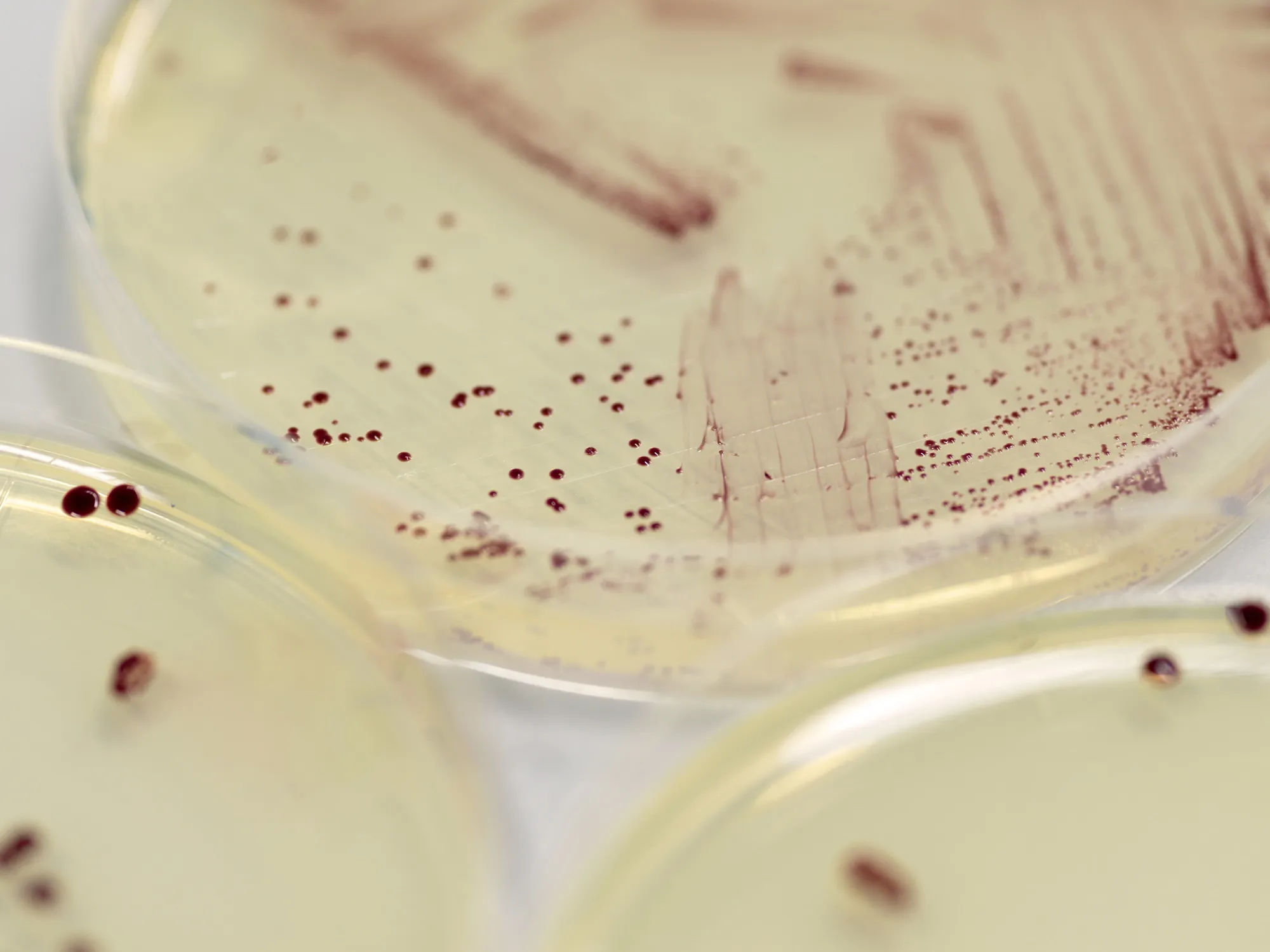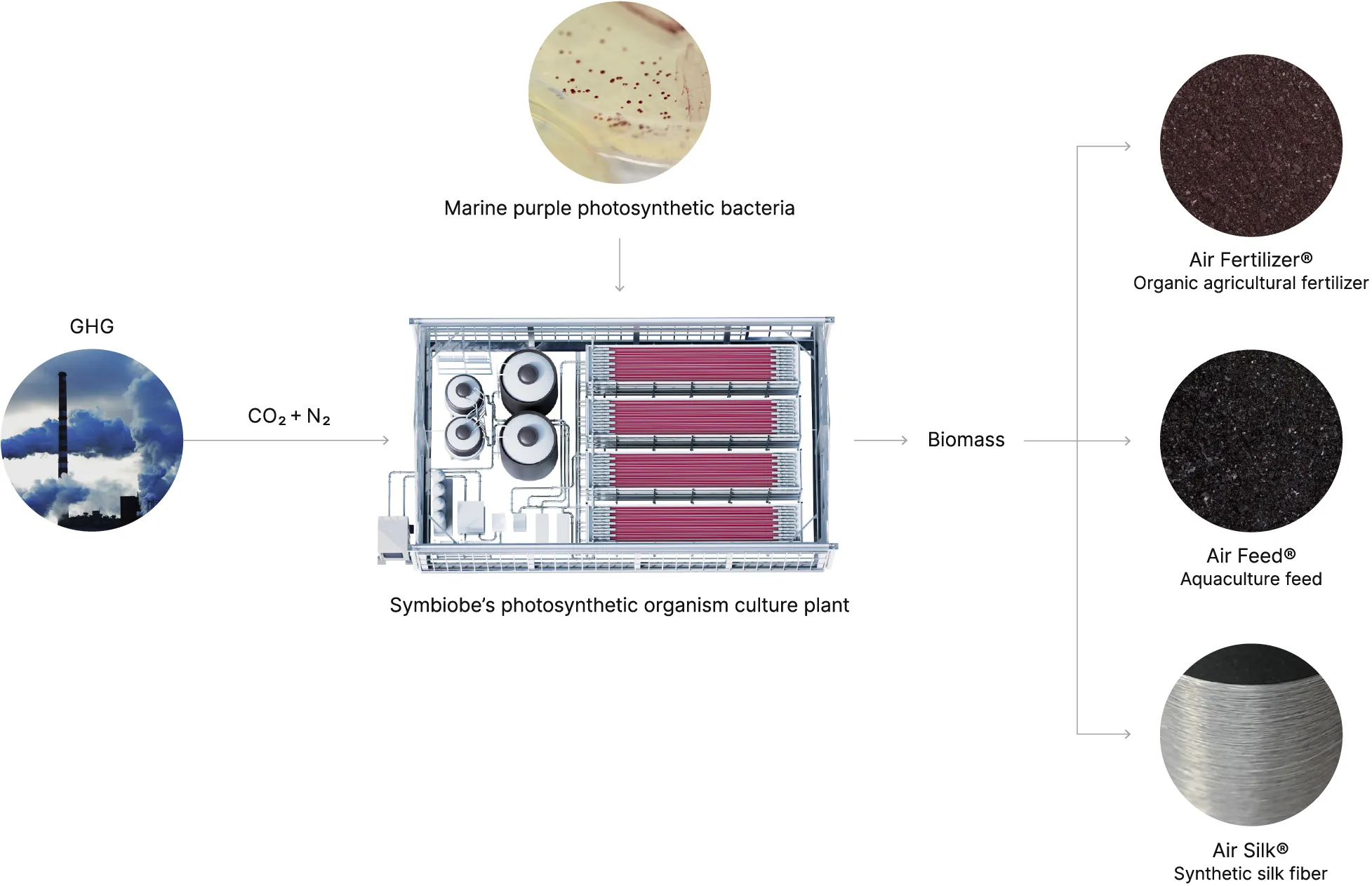Turning air into resources
The seawater that covers most of planet Earth is home to microorganisms that absorb air, engage in photosynthesis, and multiply. Symbiobe’s technology makes it possible to harness the natural power of these photosynthetic organisms to convert air into resources and to create a variety of compounds essential to human life. Working together with nature in this way represents an important step towards a future of coexistence between humanity and our planet.

From air to resources—the power of microorganisms
Marine photosynthetic bacteria, the beautiful, purple-hued microorganisms that form the heart of Symbiobe’s platform, are commonly found in seas across the globe. These microorganisms, which utilize minerals found in air and seawater as nutrients, have one particularly noteworthy feature: in order to grow and multiply, they require carbon dioxide or nitrogen, which they absorb and fix in their bodies when exposed to sunlight during photosynthesis.

Harmony between manufacturing and greenhouse gas fixation
The photosynthesis and fixation performed by Symbiobe’s microorganisms result in the synthesis of numerous organic compounds and metabolites. These products can be used as next-generation agricultural nitrogen fertilizers and as innovative, environmentally-friendly fibers that serve as alternatives to fossil fuel-based materials. This process can also convert greenhouse gases—one of the leading causes of climate change—into usable resources. To this end, one of Symbiobe’s long-term goals is the elimination of the enormous carbon dioxide emissions produced by factories, airplanes, and other sources.

Creating resources from nothing—no imports required
Current 20th century-based approaches to manufacturing involve frequent use of crude oil and nitrogen, the latter of which is employed both in fertilizers and as an industrial material. As a resource-poor country, Japan imports the majority of these resources, making it particularly vulnerable to global instability. Our desire to deliver a solution for creating resources from nothing and engaging in local manufacturing without relying on imported resources was another driving factor behind the establishment of Symbiobe’s technology.
From a linear economy to resource recycling
Solving the hitherto-unaddressed issues of climate change and resource scarcity is a mission shared by all mankind. As a global community, we can no longer deny the need to find a path towards a more balanced coexistence with our planet. At Symbiobe, we believe our technology represents one important step in helping humanity shift from linear resource consumption to a society based around resource recycling.

A company culture rooted in the spirit of academic inquiry
Symbiobe’s origins can be traced back to the work of Keiji Numata, the company’s founder, CTO, and professor at Kyoto University’s Graduate School of Engineering. Dr. Numata’s research focuses on using biomaterial science to create recycling-oriented materials.
Dr. Numata received his doctoral degree from the Tokyo Institute of Technology, where he engaged in the analysis of the crystal structures of biological macromolecules before moving to the Institute of Physical and Chemical Research (RIKEN) to work as a researcher and team leader. He became fascinated by the idea of moving beyond analysis to actually create desired physical properties by linking proteins and amino acids found in spider silk and other natural organisms, and by establishing the technology to create products based on these properties. His research in these areas continues to this day.
Dr. Numata says: “I want to create materials and an entirely new system of circulation that do not compete with conventional food and energy production, have low environmental impact, and are good for both people and the planet.” This mindset and passion for research is what drives both Symbiobe and the initiatives that Numata leads in his work at Kyoto University.
Numata LaboratoryOur advertisement feature in the online version of Nature
Focal Point on Building a Carbon-Neutral Society
Focal Point on Building a Carbon-Neutral Society, an advertisement feature collection showcasing research of Dr. Numata, was published on 11 July 2024 in the online version of Nature, a weekly international journal publishing the finest peer-reviewed research in science and technology.
